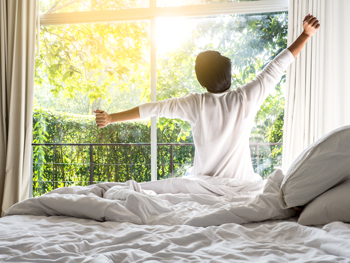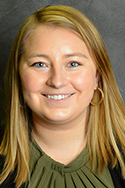Catching Good ZZzzzss: How to Wake Up Refreshed, Rested, and Recharged
by Jordan Oliphant
November 2023
Young, older, in between – and even babies sometimes – have trouble sleeping. In fact, surveys done by the Centers for Disease Control and Prevention (CDC) say that about a third of North Dakotans aren't getting very good sleep which is why "How are you sleeping," is a common question asked by healthcare providers.
Why are providers so interested in sleep? Because lots of modern science is proving that good sleep is as important for the body as healthy food choices and exercise. For example, according to American Academy of Sleep Medicine (AASM), a good night's rest improves brain health, lowers risk of serious heart problems, allows clearer thinking, reduces stress and anxiety, and improves mood.
Experts have identified what provides good sleep, starting with the recommended amount of sleep based on age. For school-aged children, 9 to 12 hours are best. For teenagers it's 8 to 10 hours of sleep each night, and for adults, at least 7 hours. It's probably no surprise that newborns and infants need between 12-16 hours.
 What are important signs
of getting enough quality sleep? Waking up feeling
refreshed, rested, and recharged. One sign of poor sleep
– despite getting enough hours of sleep
– is feeling tired and sleepy while doing tasks
throughout the day, such as driving. Daytime drowsiness
is a dangerous situation not only for the driver
themselves, but for others on the road. A CDC survey
actually found that 1 out of 25 adults have fallen asleep
while at the wheel.
What are important signs
of getting enough quality sleep? Waking up feeling
refreshed, rested, and recharged. One sign of poor sleep
– despite getting enough hours of sleep
– is feeling tired and sleepy while doing tasks
throughout the day, such as driving. Daytime drowsiness
is a dangerous situation not only for the driver
themselves, but for others on the road. A CDC survey
actually found that 1 out of 25 adults have fallen asleep
while at the wheel.
Additionally, experts recognize several causes of poor-quality sleep. One example is interrupted sleep from frequent waking to use the restroom. Another is snoring that happens with short episodes of apnea, the medical word that means to stop breathing. This type of sleep problem can not only lead to drowsy driving, but sometimes harm other body functions. If present, it's a clear reason to have it checked out.
Experts offer tips for common challenges that make it harder to get quality sleep. The first tip is to limit electronic device screen time for at least 30 minutes before bedtime because the light from devices stimulates the brain and convinces it to stay awake. Avoiding screen time provides an escape from the vicious cycle of looking at a screen, staying awake, and continued scrolling that leads to more brain stimulating light. Even people who enjoy e-reader books at bedtime might have to rethink that habit.
The second tip is to avoid caffeine in the afternoon and evening. Caffeine acts on brain receptors that delay falling asleep, which, in turn, leads to less sleep. AASM experts recommend avoiding caffeine for at least six hours before bedtime. These experts also said it is important to think about how much caffeine is consumed in a day since the recommended maximum daily amount is 200mg and the typical cup of coffee has about 90mg of caffeine.
The third tip is to avoid alcohol before bedtime. Although people may feel like they fall asleep faster after drinking alcohol, researchers have found that drinking alcohol before bed actually leads to an imbalance between sleep stages that leads to drastic decreases in the quality of sleep.
For those who struggle to get a good night's sleep, hopefully these tips about screen time, caffeine limits, and alcohol consumption can help. More sleep information can be found on the AASM Sleep Is Good Medicine website. If sleep problems continue or interfere with feeling awake or cause daytime drowsiness, schedule an appointment with a healthcare provider. No one should have to wake up on the wrong side of the bed!
This article also appeared in the November 29, 2023 issue of the Jamestown Sun.
About the Author
 Jordan Oliphant is a third-year medical student at
the University of North Dakota School of Medicine &
Health Sciences. She was selected as the Jamestown
participant for the school's ROME program, or Rural
Opportunities in Medical Education. The program focuses
on teaching student doctors the importance of rural
newspapers as a way to share health information. As a
future rural healthcare leader, Oliphant has written this
column to provide health information for her ROME
community. The information is not for diagnosis or
treatment and should not be used in place of previous
medical advice provided by a licensed provider.
Jordan Oliphant is a third-year medical student at
the University of North Dakota School of Medicine &
Health Sciences. She was selected as the Jamestown
participant for the school's ROME program, or Rural
Opportunities in Medical Education. The program focuses
on teaching student doctors the importance of rural
newspapers as a way to share health information. As a
future rural healthcare leader, Oliphant has written this
column to provide health information for her ROME
community. The information is not for diagnosis or
treatment and should not be used in place of previous
medical advice provided by a licensed provider.
